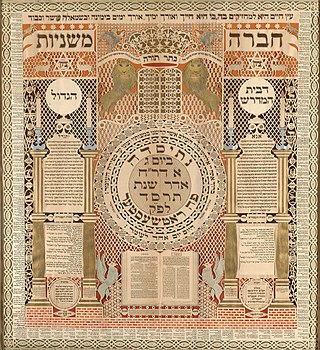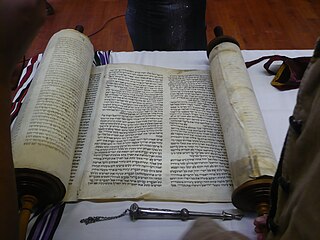
Jewish holidays, also known as Jewish festivals or Yamim Tovim, are holidays observed by Jews throughout the Hebrew calendar. They include religious, cultural and national elements, derived from three sources: mitzvot, rabbinic mandates, the history of Judaism, and the State of Israel.

Shavuot, or Shvues in some Ashkenazi usage, commonly known in English as the Feast of Weeks, is one of the biblically-ordained Three Pilgrimage Festivals. It occurs on the sixth day of the Hebrew month of Sivan; in the 21st century, it may fall between May 15 and June 14 on the Gregorian calendar.

Simchat Torah, also spelled Simhat Torah, is a Jewish holiday that celebrates and marks the conclusion of the annual cycle of public Torah readings, and the beginning of a new cycle. Simchat Torah is a component of the Biblical Jewish holiday of Shemini Atzeret, which follows immediately after the festival of Sukkot in the month of Tishrei.

Counting of the Omer is a ritual in Judaism. It consists of a verbal counting of each of the 49 days between the holidays of Passover and Shavuot. The period of 49 days is known as the "omer period" or simply as "the omer" or "sefirah".

The Five Scrolls or the Five Megillot are parts of the Ketuvim ("Writings"), the third major section of the Tanakh. The Five Scrolls are the Song of Songs, the Book of Ruth, the Book of Lamentations, Ecclesiastes and the Book of Esther. These five relatively short biblical books are grouped together in Jewish tradition.

Kiddush, literally, "sanctification", is a blessing recited over wine or grape juice to sanctify the Shabbat and Jewish holidays. Additionally, the word refers to a small repast held on Shabbat or festival mornings after the prayer services and before the meal.

It is a custom among religious Jewish & Messianic communities for a weekly Torah portion to be read during Jewish prayer services on Monday, Thursday, and Saturday. The full name, Parashat HaShavua, is popularly abbreviated to parashah, and is also known as a Sidra or Sedra.

Hoshana Rabbah is the seventh day of the Jewish holiday of Sukkot, the 21st day of the month of Tishrei. This day is marked by a special synagogue service, the Hoshana Rabbah, in which seven circuits are made by the worshippers with their lulav and etrog, while the congregation recites Hoshanot. It is customary for the scrolls of the Torah to be removed from the ark during this procession. In a few communities a shofar is sounded after each circuit.
The Three Pilgrimage Festivals or Shalosh Regalim, are three major festivals in Judaism—two in spring; Passover, 49 days later Shavuot ; and in autumn Sukkot —when all Israelites who were able were expected to make a pilgrimage to the Temple in Jerusalem as commanded by the Torah. In Jerusalem, they would participate in festivities and ritual worship in conjunction with the services of the kohanim (priests) at the Temple.
Chametz are foods with leavening agents that are forbidden to Jews on the holiday of Passover.
Lurianic Kabbalah is a school of Kabbalah named after Isaac Luria (1534–1572), the Jewish rabbi who developed it. Lurianic Kabbalah gave a seminal new account of Kabbalistic thought that its followers synthesised with, and read into, the earlier Kabbalah of the Zohar that had disseminated in Medieval circles.
Tikkun Chatzot, also spelled Tikkun Chatzos, is a Jewish ritual prayer recited each night after midnight as an expression of mourning and lamentation over the destruction of the Temple in Jerusalem. It is not universally observed, although it is popular among Sephardi and Hasidic Jews.
In Judaism, when the Eve of Passover falls on Shabbat, special laws regarding the preparation for Passover are observed.
Pesukei dezimra, or zemirot as they are called in the Spanish and Portuguese tradition, are a group of prayers that may be recited during Shacharit. They consist of various blessings, psalms, and sequences of other Biblical verses. Historically, reciting pesukei dezimra in morning prayer was a practice of only the especially pious. Over the course of Jewish history, their recitation has become widespread custom among all of the various rites of Jewish prayer.
Nittel Nacht or Nittel is a name given to Christmas Eve by Jewish scholars in the 17th century, observed as early as the late 16th century by Rabbi Samuel Eidels.

Tikkun Leil Shabbat is an independent minyan or chavurah in Washington, DC, organized entirely by volunteer leadership and sponsored by Jews United For Justice, DC's local Jewish social justice organization. The name of the community is a reference both to Tikkun Leil Shavuot and tikkun olam. Its primary activity is Friday night, but it also meets on Jewish holidays and at other times. Tikkun Leil Shabbat attracts upward of 200 participants on Friday nights.
Tikunei haZohar, also known as the Tikunim (תקונים), is a main text of the Kabbalah which was composed in the 14th century.
Shevi'i shel Pesach is the seventh and last day of the Passover holiday, which falls on the 21st of Nisan. On this day, according to the jewish tradition the splitting of the Red Sea occurred. Beyond the commandments that exist on each of the seven days of Passover, this is a full holiday, in which work is forbidden, except for work related to preparing food.

Shimon Lavi was a Sephardi Hakham, kabbalist, physician, astronomer, and poet. He is credited with the founding of religious institutions and the revival of Torah study in Tripoli, Libya, in the mid-sixteenth century, where he served as spiritual leader and dayan for more than three decades. He authored a commentary on the Zohar titled Ketem Paz and the piyyut, "Bar Yochai", a kabbalistic hymn which became widely popular in the Jewish world. Libyan Jews consider him their greatest scholar.
Flowers in Judaism hold historical and cultural significance within its traditions and practices. Flowers are especially used in synagogues and homes during the celebration of Shavuot.










